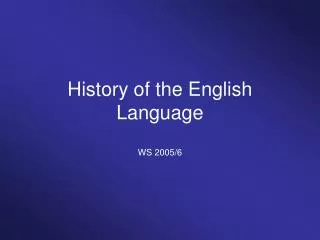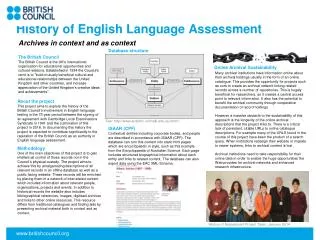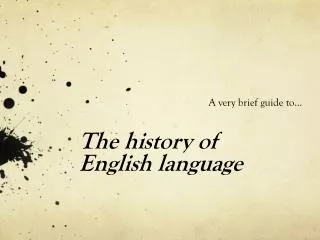History Of English Language
History Of English Language. A Time Line. The History of English Language. From its start in a jumble of West Germanic dialects to its role today as a global language--is both fascinating and complex. English began with a prehistoric language called Indo-European.
Share Presentation
Embed Code
Link
Download Presentation
- great poet chaucer
- 5th century
- new conquerors
- english today
- new zealand english
- day movies

odin + Follow
Download Presentation
History Of English Language
An Image/Link below is provided (as is) to download presentation Download Policy: Content on the Website is provided to you AS IS for your information and personal use and may not be sold / licensed / shared on other websites without getting consent from its author. Content is provided to you AS IS for your information and personal use only. Download presentation by click this link. While downloading, if for some reason you are not able to download a presentation, the publisher may have deleted the file from their server. During download, if you can't get a presentation, the file might be deleted by the publisher.
Presentation Transcript
- History Of English Language A Time Line
- The History of English Language • From its start in a jumble of West Germanic dialects to its role today as a global language--is both fascinating and complex. • English began with a prehistoric language called Indo-European. • The first settlers of the island that is now Great Britain spoke one form of Indo-European.
- The History of English Language • Great numbers of words entered English from Latin, Greek, early Germanic languages, and French. • Gradually, the language developed. • What we call Modern English had formed by about 1500 A.D.
- Germanic invaders entered Britain on the east and south coasts in the 5th century.
- The Prehistory of English A,….Bbb,…C,D………….. • The main source of information for the culture of the Germanic peoples (the ancestors of the English) in ancient times is Tacitus’ Germania, written around 100 AD.
- The Prehistory of English • According to the Anglo-Saxon Chronicle, around the year 449, Vortigern, King of the Britons, invited the "Angle kin" (Angles allegedly led by the Germanic brothers Hengist and Horsa) to help him in conflicts with the Picts ; who ultimately stem from the religion of the Proto-Indo-Europeans.
- Old English (450-1100 AD) • The invading Germanic tribes spoke similar languages, which in Britain developed into what we now call Old English. • Old English did not sound or look like English today.
- Old English (450-1100 AD) • Native English speakers now would have great difficulty understanding Old English. • Nevertheless, about half of the most commonly used words in Modern English have Old English roots. • The words be, strong and water, for example, derive from Old English. Old English was spoken until around 1100.
- Part of Beowulf, a poem written in Old English.
- Translated by Francis Gummere Lo, praise of the prowess of people-kingsof spear-armed Danes, in days long sped,we have heard, and what honor the athelings won!Oft Scyld the Scefing from squadroned foes,from many a tribe, the mead-bench tore,awing the earls. Since erst he layfriendless, a foundling, fate repaid him:for he waxed under welkin, in wealth he throve,till before him the folk, both far and near,who house by the whale-path, heard his mandate,gave him gifts: a good king he!
- Middle English (1100-1500) • In 1066 William the Conqueror, the Duke of Normandy (part of modern France), invaded and conquered England. • The new conquerors (called the Normans) brought with them a kind of French, which became the language of the Royal Court, and the ruling and business classes. This wouldn’t be such a problem if William Never Came to England.
- Middle English (1100-1500) • For a period there was a kind of linguistic class division, where the lower classes spoke English and the upper classes spoke French. • In the 14th century English became dominant in Britain again, but with many French words added. • This language is called Middle English. • It was the language of the great poet Chaucer (c1340-1400), but it would still be difficult for native English speakers to understand today.
- Modern English It’s hard to cut joke in the modern era with all the Grammar.. • Early Modern English (1500-1800) • Towards the end of Middle English, a sudden and distinct change in pronunciation (the Great Vowel Shift) started, with vowels being pronounced shorter and shorter. • From the 16th century the British had contact with many peoples from around the world. • This, and the Renaissance of Classical learning, meant that many new words and phrases entered the language.
- Modern English • The invention of printing also meant that there was now a common language in print. • Books became cheaper and more people learned to read. • Printing also brought standardization to English. • Spelling and grammar became fixed, and the dialect of London, where most publishing houses were, became the standard. • In 1604 the first English dictionary was published.
- Hamlet's famous "To be, or not to be" lines, written in Early Modern English by Shakespeare.
- Late Modern English (1800-Present) The main difference between Early Modern English and Late Modern English is vocabulary. Late Modern English has many more words, arising from two principal factors: firstly, the Industrial Revolution and technology created a need for new words; secondly, the British Empire at its height covered one quarter of the earth's surface, and the English language adopted foreign words from many countries.
- Varieties of English • From around 1600, the English colonization of North America resulted in the creation of a distinct American variety of English. Some English pronunciations and words "froze" when they reached America. In some ways, American English is more like the English of Shakespeare than modern British English is. Some expressions that the British call "Americanisms" are in fact original British expressions that were preserved in the colonies while lost for a time in Britain Spanish also had an influence on American English, with words like canyon, ranch, stampede and vigilante being examples of Spanish words that entered English through the settlement of the American West. French words and West African words.
- Today's English Today, American English is particularly influential, due to the USA's dominance of cinema, television, popular music, trade and technology (including the Internet). But there are many other varieties of English around the world, including for example Australian English, New Zealand English, Canadian English, South African English, Indian English and Caribbean English.
- English is a member of the Germanic family of languages.Germanic is a branch of the Indo-European language family.
- Shakespeare's influence William Shakespeare's influence extends from theatre to literature to present day movies and to the English language itself. Shakespeare is the second most quoted writer in the history of the English-speaking world after the various writers of the Bible, and many of his quotations and neologisms have passed into everyday usage in English and other languages. The influence of Shakespeare on the English language, both spoken and written, has been debated and opinions have varied over the centuries.
- Shakespeare’s contribution to the expansion of the English language was commented on as early as 1598, when commentator Francis Meres, applauding English literature in relation to the classics, placed Shakespeare among the writers who had dignified the language. Later in the eighteenth and nineteenth centuries, critics and scholars began to doubt whether Shakespeare had a significant effect on the expansion of English vocabulary. This is mainly based on the neoclassical image of him as a poor Latinist. In the early twentieth century, there was an overreaction to this, so that one critic credited William Shakespeare with having coined nearly 10,000 words, though some critics wonder how his audience could have understood his plays if they were full of words of which nobody had ever heard.

History of the English Language
History of the English Language. WS 2005/6. Topics. Linguistic changes: grammar and lexicon Social and political events that influenced the development of the English language English varieties Mechanisms of language change. Course script Digitale Bibliothek Thüringen
1.95k views • 74 slides

History of the English Language
History of the English Language. English is spoken in 45 different countries around the world. Over 450 million people speak the English language. Different Stages of the English Language. Old English - http://www.youtube.com/watch?v=Y13cES7MMd8&feature=fvw
565 views • 14 slides

History of the English Language
History of the English Language. A short history of the origins and development of English.
765 views • 21 slides

History of the English Language
History of the English Language. The Beautiful, Masterful Tongue. Origins of English. England (Briton) has been inhabited for 50,000 years, yet English has been spoken for only 1,500. Around 1500 -500 B.C.: Celts are the first Indo European speakers in England.
497 views • 8 slides

History of the English Language
History of the English Language. (Baugh & Cable, 2002) “The diversity of cultures that find expression in it is a reminder that the history of English is a story of cultures in contact during the past 1.500 years”
1.57k views • 6 slides

History of the English Language
History of the English Language. Tracing the development of our (largely stolen) magnificent language! This is a quickie replacement presentation, so I’m afraid it’s really straightforward and not animated. :p. The Forms of English.
1.44k views • 34 slides

History of the English Language
History of the English Language. All the Details Your Momma Didn’t Tell You. The Big Picture. The primary reason English is so quirky is that it’s a Germanic language upon which they have forced Latin grammar.
563 views • 12 slides

History of the English Language
History of the English Language. “Those who are unaware of history are destined to repeat it” – George Santayana. What do these words have in common? . Lunar. Saga. Abandon. Whiskey. Plethora. Kindergarten. Penguin. English has gone through 4 major periods:
526 views • 14 slides

History of the English Language
History of the English Language. Chaucer’s “Canterbury Tales”. Old English 1 .
350 views • 19 slides

History of English Language Assessment
History of English Language Assessment. Archives in context and as context. Database structure. The British Council
451 views • 1 slides

History of the English Language
History of the English Language. The Anglo-Saxon Invasion and the Norman Invasion of the British Isles. English Begins. The first English arose about 1500 years ago when the British Isles were invaded by Germanic tribes. We would consider these tribes to be Vikings today.
606 views • 17 slides

History of the English Language
History of the English Language. A Brief Overview. Periods of English. Old English Circa 410 – 1100 A.D. Middle English 1100A.D. – 1500 A.D. Early Modern English 15oo A.D. – 1650 A.D. Modern English 1650 A.D. - present. English Pre-History. The Celts and The Romans.
759 views • 24 slides

History of the English Language
History of the English Language. Why is English so inconsistent?. Through Though Bough Ought Cough Rough. Linguistically Influential Periods of Early English History. 1. Pre-Roman/Celtic Period up to 55 B.C. 2. Roman Occupation 55 B.C. – 410 A.D.
1.64k views • 37 slides

History of the English Language
History of the English Language. Or…Why English doesn’t make any sense.
501 views • 26 slides

History of the English Language
History of the English Language. ENGL 4300-01 Spring Semester 2005. Information. Name An email address Phone # Major and Year (Junior, Senior, etc). Other information I may need to know. Language– A Definition.
333 views • 8 slides

History of the English Language
History of the English Language. HISTORICAL BACKGROUND. Nostratic: a proto-language. The Ancients. Wilfred van Soldt: "Mesopotamia gave us the wheel, writing and astronomy and can rightly call itself the birthplace of our civilisation." Mesopotamia Egypt China India
546 views • 20 slides

The history of English language
The history of English language. A very brief guide to…. Early beginnings. Before 100 B. C., Britain was populated by a mixture of tribes, including the Celts, Picts, Irish and Cornish. They all spoke a variety of Celtic languages. The origins of English.
1.18k views • 17 slides

History of the English Language
History of the English Language. History of the English Language. A language develops over centuries of time; as it develops, it changes. We have no idea when English language started. The Stonehenge People.
1.01k views • 58 slides

History of the English Language
History of the English Language. History of the English Language. A language develops and changes slowly over centuries. We do not know when the English language started. Stonehenge. Stonehenge
808 views • 58 slides

History of the English Language
History of the English Language. Language Terminology. linguistics: The study of the nature and structure of language and languages. cognate: Descended from a common ancestor; of the same family. etymology:
526 views • 14 slides

History of the English Language
History of the English Language. Class Notes Sept. 17, 2014. Vikings!. 793 CE onward. Alfred the Great. Alfred the Great. Ruled from 871-899 CE Consolidated a divided “ nation ” Used the word Angelcynn Fought/negotiated with the Danes Captured London, taking it from the Danes
419 views • 13 slides

History of the English Language
History of the English Language. The Beautiful, Masterful Tongue. Origins of English. England (Briton) has been inhabited for 50,000 years, yet English has been spoken for only 1,500. Around 1500 -500 B.C.: Celts are the first Indo European speakers in England.
208 views • 8 slides
























